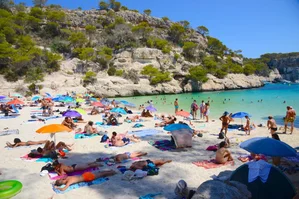Canarian Government Pushes for Consensus on Tourist Regulation Amendments

In a significant development for the tourism sector in the Canary Islands, the regional government and various stakeholders are urging for consensus and avoiding polarization as they navigate necessary modifications to the tourist regulations. This initiative comes at a time when the islands are grappling with the impacts of mass tourism and seeking more sustainable models.
The Proposal for a Tourist Tax
At the forefront of this debate is Nueva Canarias-Bloque Canarista (NC-BC), which has, for the third time since 2011, presented a proposition for the creation of a tourist tax in the Canary Islands. This proposal, recently registered in the Parliament, aims to introduce an impost on tourist stays, a measure that has been successfully implemented in other regions such as Catalonia and the Balearic Islands.
NC-BC's president, Román Rodríguez, emphasized the necessity of this tax, highlighting that it would not only generate significant revenue but also contribute to making the tourism sector more sustainable. The proposed tax would be paid exclusively by visitors, thereby not affecting residents or local businesses. Rodríguez noted that the current economic strength of the tourism sector, marked by a high number of visitors and substantial spending, makes it an ideal time to implement this measure.
Public Support and Institutional Backing
The initiative has garnered support from various segments of the population, including the movement "20A" which has been advocating for changes in the tourism model. Additionally, institutions like the Cabildo of Gran Canaria and several municipalities have expressed their backing for the tourist tax.
Natalia Santana, the parliamentary spokesperson for NC-BC, justified the proposal by pointing out the economic disparities in the Canary Islands, where despite being a major tourist destination, the region suffers from high poverty rates, low salaries, and precarious working conditions. The tax is envisioned to help address these issues by generating an estimated 250 million euros in additional revenue for the regional government in 2025.
Historical Context and Previous Attempts
This is not the first attempt by NC-BC to introduce a tourist tax. Previous proposals in March 2015 and January 2019 were met with resistance from the governing parties at the time and were not taken into consideration. However, with growing public support and the increasing recognition of the need for sustainable tourism practices, NC-BC remains optimistic about the current proposal's chances of success.
Broader Implications for the Region
The introduction of a tourist tax is part of a broader strategy to manage tourism more sustainably in the Canary Islands. The region has been experiencing significant tourist influx, which, while economically beneficial, also poses challenges related to infrastructure, environmental impact, and social welfare.
As the debate continues, it is clear that finding a consensus on these regulatory changes is crucial for the long-term sustainability of the tourism sector in the Canary Islands. With the support of various stakeholders and the growing public awareness of the need for sustainable tourism practices, there is a renewed hope that this initiative will finally come to fruition.
Related Stories

Northern Spain Named Best Global Destination for a Road Trip
Northern Spain wins title of best global road trip destination by Travelbook.de, celebrated for its stunning landscapes, rich culture, and scenic routes.

Discover the Best Cycling and Mountain Biking Routes in Cantabria
Explore the stunning cycling and mountain biking routes of Cantabria, Spain. From coastal paths to challenging mountain trails, discover routes for all skill levels amidst breathtaking landscapes.

Train Derailment Between Atocha and Chamartín Affects Thousands of Commuters
Train derailment in Madrid tunnel disrupts 13,700 commuters, with ongoing efforts to restore service between Atocha and Chamartín stations.

Normality Restored in Spanish Rail Network After Disruptions
Spanish rail services to resume normal operations on Oct 21 after disruptions, ADIF confirms, marking an end to weeks of travel chaos for commuters and tourists.

Illegal Tourist Rentals Surpass Legal Ones in Menorca, Raising Alarms
Illegal tourist rentals in Menorca now outnumber legal ones, posing threats to the island's sustainability and living costs, with calls for urgent regulatory action.